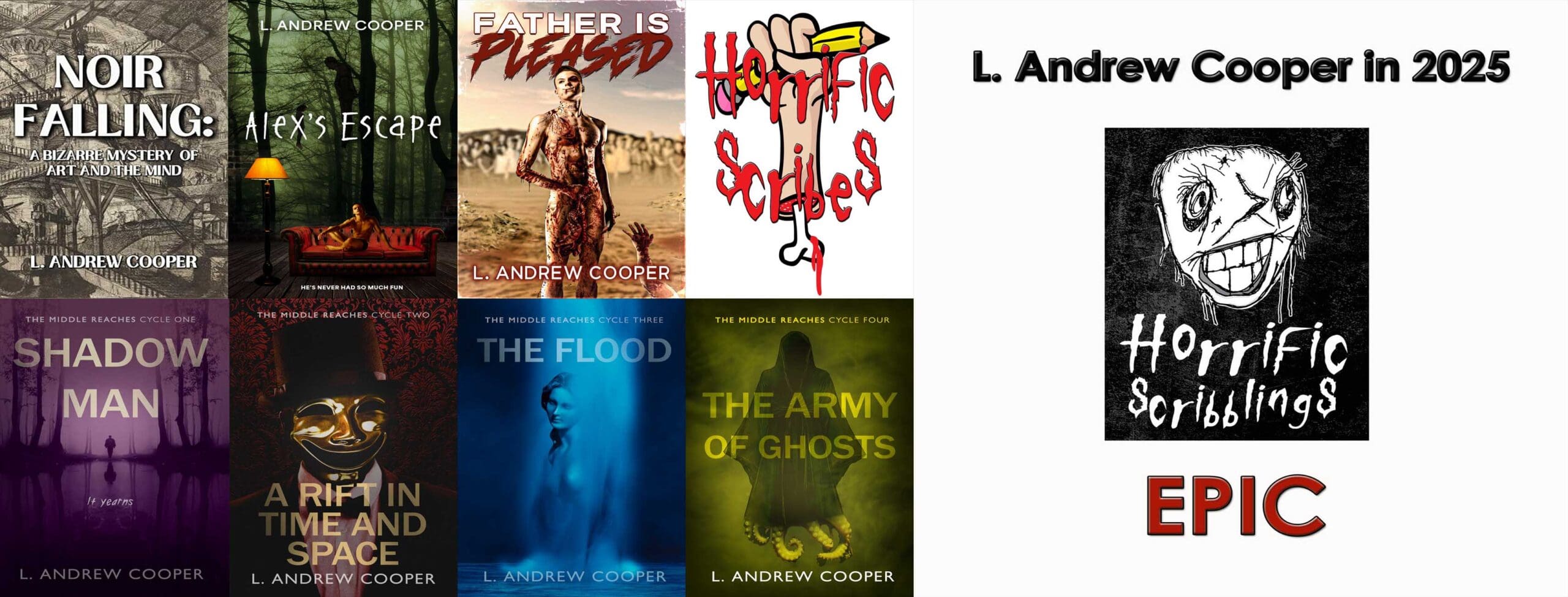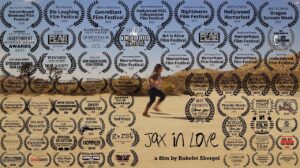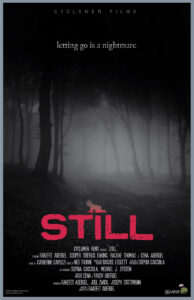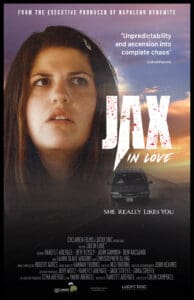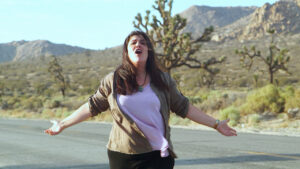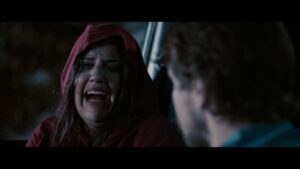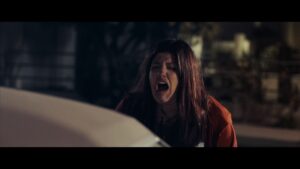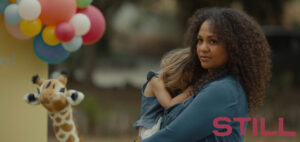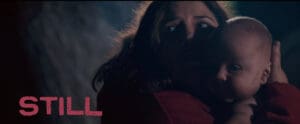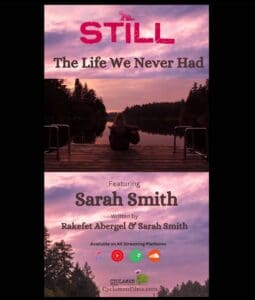Interview with Filmmaker Rakefet Abergel: “Jax in Love,” “Boo,” and “Still” (2024)
Accomplished filmmaker Rakefet Abergel is here to discuss three of her short films, destined for an anthology disc in the very near future, that explore horrific experiences with unusual perspectives that lead to jolting twists. Two of the films you can see now on YouTube and Amazon Prime!
“Jax in Love”
Jax, a lonely wanderer, is searching for a human connection. How far would YOU go for love?
A mysterious and lonely young woman, Jax (Rakefet Abergel) is traveling through the expansive desert of the American West, in search of some tangible connection, a kindred spirit or like-minded soul with whom she can bond. When her car breaks down in the middle of nowhere, her journey takes a dangerous turn, and we learn this seemingly sweet woman may not be who she seems at all. How far will she go for love? Will she make it out of the desert alive? (20:19)
“Boo”
A traumatic event forces a recovering addict to face her demons, without her worried fiancé uncovering the truth.
Over the course of a rough night, Devi, seven years sober, must make a difficult choice between who she loves and what she loves. “Boo” is a tense tale of what happens when addiction threatens to get the best of one woman at exactly the wrong time. We all have our addictions. What’s yours? (14:10)
“Still”
A despondent mother’s reality crumbles as she faces the unthinkable. (11:45)
The Interview
1. Women in/and Horror. Your films’ focus on women and female experience might justify calling them feminist. How do you think of them? Do you see any problem with associating the empowered or at least the center-screen feminine with horror? Why or why not?
RA: I’m not sure if I would use the word “feminist” to describe them. I just think we haven’t seen enough horror with a female protagonist that isn’t being chased by a killer! I think there is something empowering about women being able to play the bad guys and about women being portrayed as complex characters who don’t just take their shirts off.
2. Not a Typical (Gothic) Romance. As the description suggests, “Jax in Love” begins with a lonely young woman stranded alone, in danger, perhaps, inherently for being a woman alone, a centuries-old horror trope the values of which your film does not necessarily share. How conscious were you of the tradition of such cautionary tales while creating “Jax in Love?” Do you think the film reinforces it, undermines it, or both? Why?
RA: I was definitely conscious of the stereotypical trope of a woman alone in the horror genre. I wanted to turn that on its head and use viewers’ expectations against them. I think the film definitely undermines the trope, showing that you can’t always believe what you see and that you don’t always know what to expect. I think there is value in that twist.
3. Atypical Encounters. As Jax encounters more people on her journey, the film eventually introduces the topic of mental illness, often a fraught issue in the horror genre. Here, the depiction seems more than usually thoughtful—in your view, how does “Jax in Love” reflect on mental illness? How sympathetic is it? How does your style convey the experience of atypical thoughts and perceptions?
RA: Jax is a deeply troubled young woman with a lot of trauma behind her. I think the film is very sympathetic to her illness, even somewhat excusing her violent behavior with empathy for her condition and the reasons for it. I didn’t get too much into her back story in the short, but I’m developing a series around the character that explores her childhood trauma a lot more. I think there is something interesting about feeling sympathy for a character who is doing very bad things. Life isn’t a simple black and white equation; there are nuances and grey areas, and most villains are just heroes with the wrong intentions.
4. Jax in a Series. Your bio mentions that you’re working on a pilot version of “Jax in Love.” What can you reveal about the pilot and your vision for making Jax’s journey a series? What roles would you play in making the series (writer, producer, director, actor, etc.)?
RA: I would definitely love to play Jax in the series, as well as direct. I would probably do most of the writing as well, at least up front. After that I would be happy to include other writers so that I could focus more on the other aspects. The series would explore her childhood and the various traumas she endured that culminated in her becoming who she is. I think it will give even more empathy to the character, and I also think the audience would end up cheering her on, much like we do with the lead in Dexter. To me that series is a nice parallel to what I’m trying to achieve.
5. Structured Scream. Most of “Boo” has a layered narrative structure, following two timelines, one leading up to and one following from a traumatic event. Why did you choose this structure, and how does it change (or I’d hope you say enhance) the viewing experience? How does it shape the development of Boo’s character?
RA: Originally the script was in chronological order, but a friend of mine read it and suggested I go with the dual timeline, which definitely makes it more exciting and tense. Again, I am using the viewer’s expectations against them when the twist is revealed. I rather like subverting expectation because I feel that I embody that dichotomy in my real life as well. People assume they know who you are, and most of the time I don’t fall into the category you might expect. I think that makes me more interesting, and I think that makes the characters more interesting as well.
6. Being Boo. I never want to overlook any aspect of filmmaking, but I do feel that the intensity of “Boo” depends largely on the intensity of your performance in the lead role—and the film is pretty darned intense. How do you feel about being your own star? When you’re conveying extreme emotions for the camera, how do you keep worrying about the shot’s framing from affecting your performance? In brief—how did you manage your multihyphenate status on “Boo”?
RA: It’s really tough to act and direct and produce at the same time. I do it because I truly love the first two things. The producing is something I’d happily give up to someone else if I had someone else to do it! Sometimes I wonder what it would be like to direct without having the burden of starring in it, but I love acting so much that I think I would be jealous of my own cast! The best way I’ve found to make sure I’m getting a good performance and a good shot is to have a really great crew behind me, especially in the roles of cinematographer, any other producers, and an excellent first A.D. A script supervisor with a keen attention to detail is another really important part of it. If you have enough people that you trust watching you and the monitor, it makes it a lot easier to focus on the performance.
7. Still, Genre. I can imagine many people wanting to classify “Still” as an art film or drama rather than a horror film. How do you think of it? Art film? Art horror? Whether or not we as artists think categories matter, we all must deal with them when we face marketing and distribution. What are the consequences of categorization for “Still”? What does the viewer gain and/or lose by going in expecting a horror film?
RA: “Still” is probably more drama than horror, or maybe psychological art horror. I know some festivals have already expressed that they aren’t sure where to put it. I honestly don’t think categories matter that much. Is the film good? Does it resonate with audiences? I think those are the things that matter. Horror is such a wide genre. There are so many types of horror. If people are going in expecting a slasher film, they will be very disappointed. But I think there are many horror films that aren’t typical horror but still fill you with dread, or sadness, or fear. Losing a baby is one of the most horrific experiences I can imagine. Sometimes horror isn’t about the body count or a murderer. Sometimes it’s about exploring an extremely horrific experience and what that can do to the human psyche. Even the first Saw movie wasn’t all that graphic. It was more about the horrific experience they were going through. Most of Hitchcock’s work wasn’t gory, and yet still insanely terrifying. Maybe for some people reliving an incredibly painful experience that no one wants to live through is horrific.
8. Still, Form. I would say “Still” tells two stories, one in the background about a traumatic event and one in the foreground about the protagonist’s, Aliya’s, emotional response to the trauma. As in both “Jax in Love” and “Boo” (which looks at addiction), “Still” examines a mental disorder, this time post-traumatic stress that disrupts film form to a degree where narrative doesn’t follow any clear timeline, often relying on match cuts and other editorial strategies to convey associational thinking. What inspired your narrative form? Would you describe it as abstract or surreal? Why or why not? Do you think a more typical form could have allowed you to explore the emotional experience you depict as accurately? Why or why not?
RA: So, our first cut of the film was according to the script, which didn’t rely on the unclear timeline or surrealism. And it came out very boring. The script isn’t plot based. It’s emotion based. And visually it just wasn’t working at first. So, I took a small crew up to the Angeles Forest to shoot some B roll, and I worked for many, many hours with our incredible editor, Ned Thorne, on crafting something that we could visually FEEL instead of SEE. It wasn’t my original intention, but I think the way we ended up cutting it is much more intense, interesting, and emotionally charged. I would say it’s more surreal than abstract. When someone is in a state of mental distress, time doesn’t happen the same way. Things come and go. Grief is an ongoing wave that swells and retreats. I don’t think a more typical format would be more accurate. I think that a film about grief should make the viewer feel like they are going through it as well. And that’s what we tried to do with it. Whether we succeeded at that or not is up to the audiences!
9. Still, Intimacy. Your style in all three of these films often feels intimate, but perhaps because it focuses more on horrific feelings than horrific events, “Still” feels the most intimate. The intimacy comes sharply into focus when the memorial appears at the end of the film. Do you mind sharing the inspiration for “Still?” in general, how much does autobiography influence your art? To what extent, if at all, is self-expression through film therapeutic?
RA: “Still” was based on the feelings I had around the loss of my pregnancy in 2021. Although I was only pregnant for a short time, I had already imagined a lifetime with this child. I had already made plans, named him, told people about it, considered how my life might change. And when I lost him, I lost an entire future I thought I had, too. I don’t think people who haven’t gone through it realize that it’s more real than it seems. I wondered if people would say the same things they say to someone who’s miscarried if that child was already alive and somehow was lost. Because to me, it was like he was already here. And hearing things like “well at least it was early” or “you can always try again” felt so hurtful and dismissive. No one would say things like that to someone who lost a child that had already been alive.
All three films come from deeply traumatic experiences in my life. Emotions are how I navigate the world. Self-expression through film has been very therapeutic for me. Sometimes just exploring those feelings and putting them out there helps me feel that I am allowing myself to be understood better. Sometimes emotions are hard to convey, but film is such a terrific medium for that. Movies make us feel all sorts of things. They change our perceptions. They challenge our beliefs. And horror is a perfect genre to explore the darkest feelings. That’s why my films aren’t typical horror. For me the emotions and the reasons for them are horrific enough. I don’t feel the need to make something just for the sake of being scary. Love is scary. Addiction is scary. Grief is scary. Loss is scary. Emotions are scary. I think there’s room in horror for all kinds of scary.
10. Access! How can people learn more about you, view your films, purchase your films, and generally get access to your world (please provide any links you want to share)?
RA: I’m working on putting all three films onto a compilation DVD called Love Scars that will also include behind the scenes featurettes, trailers, pitch videos, music videos, possibly audio commentary, and more. For now, you can watch “Jax in Love” and “Boo” on various platforms including ALTER, YouTube, Red Coral Universe, Amazon Prime, ShortsTV, and various DVD and Blu-Ray anthologies.
“Still” is making the festival rounds this year and next and will be available online probably in 2025. You can watch the trailer and the music video with the original song “The Life We Never Had” by me and Sarah Smith, on both of our YouTube channels. The acoustic and electronic versions of the song are also streaming on all available music platforms.
You can follow me, the films, and my production company, Cyclamen Films here:
www.CyclamenFilms.com
www.facebook.com/RakefetAbergel
www.facebook.com/CycalmenFilms
www.facebook.com/StillAShortFilm
www.instagram.com/cyclamenfilms
About the Filmmaker
Rakefet Abergel is an accomplished director, writer, and producer known for her unique voice and creative vision. Born in Los Angeles, Abergel began her career in the entertainment industry as an actress, working in both film and television.
She enrolled in the film program at Boston University, where she honed her skills and developed her unique style. After several years of acting, Abergel shifted her attention to directing and writing.
In the last several years, she has produced and/or directed a couple of critically acclaimed short films, including “Jax in Love”, “Boo,” and currently, “Still”, all three of which she also wrote and starred in. Her films are streaming on ALTER, Bloody TV, ShortsTV and Amazon Prime and available on several DVD and Blu-ray anthologies.
Her writing, acting and directing have been recognized with numerous awards and honors and her films have screened at festivals around the world.
Abergel’s work is characterized by its bold, unflinching honesty, and her ability to explore complex themes and emotions in a way that is both authentic and relatable. Her films often explore issues related to identity, relationships, and personal growth, and she has been praised for her ability to tackle these topics with sensitivity and nuance.
In recent years, Abergel has continued to expand her portfolio and is currently in development on a pilot version of “Jax in Love” and several feature films.
She also teaches Hebrew and Bar/Bat Mitzvah studies to kids in Los Angeles, and works as an acting coach and mentor at Kid (F)Actor, an acting school she founded in 2010.
An established multihyphenate, Rakefet Abergel has proven herself as a force to be reckoned with in the entertainment industry. Her unique voice and creative vision have earned her a loyal following of fans and admirers, and her work continues to inspire and provoke audiences around the world.
